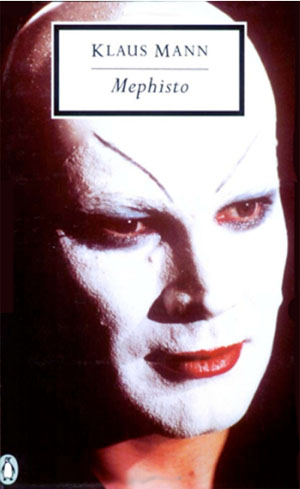— Book Review by Jens Kruse —

This novel, Mephisto, by Klaus Mann, the second child of the better-known German novelist Thomas Mann, was written in 1936 while Klaus Mann, persecuted by the Nazis, was living in exile in Amsterdam, and first published there. Later in 1936, Klaus Mann emigrated to the U.S., where he lived in Princeton, NJ and New York while his father emigrated to Pacific Palisades, CA, where Klaus also sometimes lived. Klaus Mann became an American citizen in 1943 and served in the U.S. Army during the last years of World War II and in the immediate postwar period, as a correspondent from occupied Germany, for Stars and Stripes.
So you may be asking yourself why I have decided to review here and recommend to you a somewhat obscure 1936 novel when I normally review recently published works of non- fiction or fiction. Because sometimes it is the task of the reviewer to bring to the attention of readers somewhat forgotten works that seem relevant in the current historical moment.
For, you see, Mephisto is a novel about a pact with the devil. The subtitle of the German text, which Robin Smyth’s otherwise excellent translation omits, is “novel of a career.”
The career in question is that of the actor, and later theater director, Hendrik Höfgen. Höfgen is a talented and ambitious actor in Hamburg, and then Berlin, an actor with left-leaning, even Communist sympathies, who, when the Nazis come into power, decides to use connections to one of the highest of the new rulers to advance his career, his social standing, and his
wealth.
In other words, the protagonist of this story sells his soul to the devil, which is especially delicious since the role that made him most famous in the run-up to the Nazi dictatorship was that of Mephisto, the devil, in Goethe’s Faust: the person Höfgen enters into a pact with the devil, while the actor Höfgen, by playing the devil, gains the fame and influence to allow him to
make that pact.
As one would expect, Höfgen’s rise is bought at the price of the betrayal of his principles, his friends, and his lovers. His conscience at times torments him, but mostly his actor’s ability to slip in and out of roles allows him to successfully play his dangerous game of dancing his dance with the dictatorial regime.
All of this becomes even more interesting when we know that what Klaus Mann wrote was not simply a work of fiction. Even though Mann resented the characterization that Mephisto is, in fact, a roman a clef, a fiction that thinly veils real characters and a real story, Hendrik Höfgen is the actor Gustaf Gründgens, whom Klaus Mann knew well and worked together for leftist causes, and who briefly was married to Mann’s sister Erika. The Nazi Prussian Prime Minister and Air Force General whose protection allows Höfgen’s rise in the Nazi dictatorship is Hermann Göring, the Propaganda Minister who is competing with the Prime Minister and is a threat to Höfgen, is Joseph Goebbels, etc.
When Hitler is appointed chancellor Höfgen is in Spain doing film work. He is shocked by the news; he had never taken the Nazis seriously. He is also afraid: his left leaning views are well known, he has clashed with Nazis at his theater. Friends urge him not to return to Germany. But after half a bottle of champagne Höfgen begins to reevaluate his situation: he belonged to no party, he was not a Jew, he was a blonde Rhinelander, he should be fine. He moves on to Paris to bide his time and to consider his options. It is there that he gets the news of the Reichstag fire that allows Hitler to seize dictatorial powers.
But, oddly, these developments do not convince him that he must become an émigré and resist Hitler from the outside, as so many of his friends and acquaintances have chosen to do, on the contrary.
How strong evil is thought Hendrik with an awestruck shudder. How it seizes on everything it wants and escapes unscathed! Things really happen in the world as they do in the films and plays in which I have so often been the hero. This was as boldly as he ventured to put it to himself at the moment. But without wanting to admit as much, he felt for the first time a mysterious connection between his own nature and the appalling mentality that could instigate such base acts as the burning of the Reichstag. (159)
It is soon after these reflections that Höfgen, when an opportunity arises to advance by ingratiating himself with the new regime, seizes it, returns to Germany, and makes his “Pact with the Devil” as this chapter is called.
The remainder of the novel chronicles his meteoric rise in artistic success, social status, and wealth, accompanied by his descent into moral corruption and criminal complicity.
Mephisto (New York: Penguin Books, 1995) is available through
Darvill’s Bookstore.
P.S. Please stay tuned for an announcement about a new course offering: “How to Sell your Soul: Literary (mostly) Manifestations of the Faustian Bargain from the 16th Century to the Present.”








